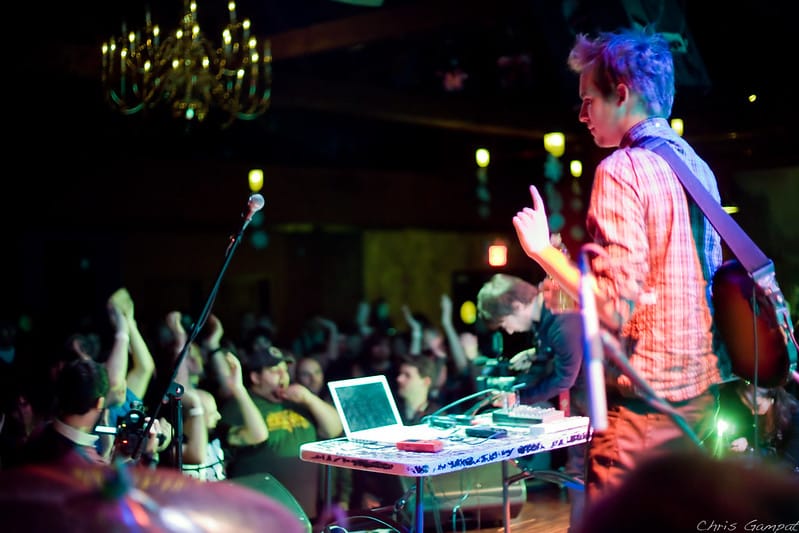Live Nation just took over the Bell House; what does it mean?
The Gowanus venue is now part of the international corporation; some artists say that spells trouble

In 2008, scientists had discovered that “every kind of imaginable pathogen” including gonorrhea was growing in the Gowanus Canal, and that felt as good a time as any to start the Brooklyn comedy boom on the waterway’s shores.
The Bell House opened that year about a block from the canal, long before the neighborhood was home to a Whole Foods, shuffleboard club or a rezoning that allowed luxury condos full of jerkos to start crowding for property on the notoriously noxious canal like it was the Williamsburg waterfront.
The venue, carved out of an old printing press warehouse, became a beacon that drew people to the still-industrial area for the borough’s burgeoning comedy scene, but also attracted national touring bands, dance parties, food competitions, holiday parties, markets, burlesque, even a blogger meetup or two when those kinds of things were happening. It was a place that was as good for catching a very aughts celebration of memes as it was for finding someone to go home with at the end of the night. It more or less kicked off the so-called “Gowanaissance.”
The Bell House, which had been owned independently since 2008 by the same team that ran Union Hall, was quietly sold earlier this year to Live Nation, the company that owns Ticketmaster, according to sources familiar with the conversations. No announcement was made about the sale so the exact timing is unclear; one artist said the sale was announced to performers in November and finalized in the spring. But the hand of Live Nation — which is currently the target of an antitrust lawsuit by the Biden administration — has already been felt at the venue.
Gone from the calendar are the dance parties, themed events, Dolly Parton cover bands, wedding expos and the Harry Potter proms that defined its offerings for most of the venue’s life. Gone too are most of the musical acts that filled its calendar. Instead, the booking of the space has shifted almost entirely to comedy, and the stepchild of comedy: live podcast performances. Sources who’ve worked with the venue told us the Bell House is now part of Live Nation’s comedy venue arm. (Union Hall was not part of the deal and remains independent).
Bookers, producers and performers who’ve loved the venue — and its “Don’t Give Up the Ship” flag backstage — are already mourning the change.
“One beautiful facet of the Bell House's place in the New York comedy scene is that it doubles as both a great venue for seeing a show and a really special hub for the community,” one male comedian who’s frequently performed at the Bell House (and who asked to to not be named for fear of offending bookers) told The Groove. “The booker and the marketing team do such a great job taking chances on emerging artists and concepts, and giving them the best possible chance to succeed. My big fear is that as it's engulfed into the bigger Live Nation fold, the venue will lose a little of its cozy Brooklyn familiarity for artists.”
If you missed the news about the change in ownership at the Bell House, that may have been on purpose. Neither entity apparently announced the move, and no outlets reported it, until now. Sources connected to the venue told The Groove the move had been in the works over the past year, but the takeover seems to have been official only recently: job postings for the venue started appearing under the Live Nation banner in May.
“It’s a blow,” said Nell Casey, co-owner of Secret Formula, which produced pop culture and TV parties at the venue before the pandemic. “The Bell House offered a space for the oddball, the off-the-beaten track event perhaps without national recognition but one welcomed enthusiastically by locals. Given their size and popularity in the NYC nightlife scene, The Bell House was willing to take a chance; that's rare to find and about to become more so, it seems.”
One influential event promoter and producer, who also asked for anonymity to not damage business relationships, said he was worried about what this means for the future diversity — and affordability — of events at the venue.
“We went to the Bell House when it opened, since the beginning,” he said. “Now to find that they are part of this larger thing, it does make you wonder what the programming is gonna be like. Who’s it going to cater to now? Will it just go for higher ticketed things? After a while they’re gonna be like, ‘Hey we’re part of this corporate machine and we need to make more money.’ Do ticket prices go up? Do ticket fees go up?”
‘Like you're at the airport’
Live Nation did not respond to a request for comment, and the previous owners of the Bell House could not be reached before press time. In New York, the company that owns Ticketmaster already also owns Gramercy Theatre, Warsaw, Brooklyn Bowl, the new Brooklyn Paramount theater and Irving Plaza Powered by Verizon 5G (that’s what they call it!), among others.
The bookings are one thing, but people connected to the venue are also worried about the overall vibe shift they’ve already noticed.
“I think the saddest part of the sale is walking in and seeing the obvious changes,” one musician who’s worked at the space over the past decade, told me. “Big clunky POS machines, people on walkie-talkies, the funky beer price sign gone in the main room.”

The Brooklyn Beefsteak in 2009, one of the many food-centric events the Bell House used to host. (Photo via Jasoninbklyn/Flickr)
The change from the friendly neighborhood venue to one owned by a company currently being sued for making Taylor Swift tickets too expensive was noticeable to others, too.
“I just don't understand why a local venue like The Bell House even needs to be owned and run by a global corporation,” another comedian who’s done lots of shows at the venue said. “Now you have to go through a metal detector and wear wristbands, both of which slow the check-in process down so there's less time hanging at the bar and getting excited before a show and more time waiting on a line like you're at the airport.”
The Bell House has also long served as a venue where many local comics got a break; the same comedian worried that will no longer be the case.
“If it becomes a venue for more touring acts ... I'm not sure where that leaves some of the local comics who perform there,” she said.
For now, the lineup at the Bell House going forward is not exactly booking the Dave Chappelle “And Another Thing About Trans People” tour or the Joe Rogan Dumb Shit for Dummies Variety Hour; the lineup is still relative to its 500-capacity room. In the next two months, the calendar includes solo shows from Maria Bamford and Aparna Nancherla, and podcast events featuring Jonathan Van Ness and Who? Weekly.
Those shows are not totally unusual for the venue; but in the past they would be interspersed with other burlesque, trivia, science and dance nights. Even the comedy in years past was not always standalone acts. Comics often performed as part of a themed show, or comedy festival. Oftentimes, a separate event would be happening in the front room, like a dance party or trivia night.
“With their reach, I expect they would get big performers out there,” the promoter said. “But we don’t always care about the big performers.”
In its lawsuit against the ticketing giant, the Biden administration accused Live Nation, often considered the world’s largest entertainment company, of being a monopoly to the detriment of audiences and concertgoers.
“The result is that fans pay more in fees, artists have fewer opportunities to play concerts, smaller promoters get squeezed out, and venues have fewer real choices for ticketing services. It is time to break up Live Nation–Ticketmaster,” attorney general Merrick Garland said in the lawsuit filed in May.

Time was you could see Ira Glass in a human pyramid at the Bell House; are those days gone? (Photo via Caroline Creaghead/Flickr)
For whom the bell tolls
Some artists connected to the venue worried it would no longer be home to adventurous bookings such as T4T, a recent show of all trans performers. Comedy is actually taking over lots of venues in the city, the promoter said, with shows popping up in tattoo shops and CBD stores. The cost of a comedy show can be lower than other kinds of events, and comedy was one of the first things that started back up after lockdown.
“I find it hard to find parties that aren’t, say, at some nightmare place with outrageous prices and insane crowds,” the promoter said.
The city is forever dying and being reborn, and great venues rise and fall even when there isn't a global pandemic that disrupts everything. Many venues across the city have closed entirely in recent years due to greedy landlords or pandemic slumps. It’s too soon to know exactly what will become of the Bell House, but the specter of a new multinational conglomerate owner and metal detectors at the entrance does not bode well.
“I'm always excited for local venues to book exciting and renowned acts, but I hope the excellent and experienced staff isn't compelled to turn a beloved community institution into simply a way station for touring acts with proven draws,” the male comedian said. “Also, the last time I was there the bartender gave me a free drink at last call, and I'd like that to keep happening too on occasion please.”




Comments ()